高考英语新情态动词知识点易错题汇编及答案解析(4)
- 格式:doc
- 大小:57.50 KB
- 文档页数:8
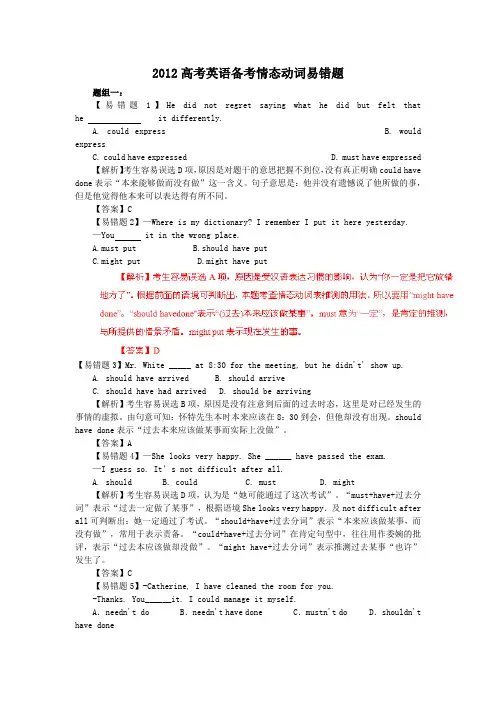
2012高考英语备考情态动词易错题题组一:【易错题1】He did not regret saying what he did but felt that he it differently.A. could expressB. would expressC. could have expressedD. must have expressed【解析】考生容易误选D项,原因是对题干的意思把握不到位,没有真正明确could have done表示“本来能够做而没有做”这一含义。
句子意思是:他并没有遗憾说了他所做的事,但是他觉得他本来可以表达得有所不同。
【答案】C【易错题2】—Where is my dictionary? I remember I put it here yesterday.—You it in the wrong place.A.must putB.should have putC.might putD.might have put【易错题3】Mr. White _____ at 8:30 for the meeting, but he didn't' show up.A. should have arrivedB. should arriveC. should have had arrivedD. should be arriving【解析】考生容易误选B项,原因是没有注意到后面的过去时态,这里是对已经发生的事情的虚拟。
由句意可知:怀特先生本时本来应该在8:30到会,但他却没有出现。
should have done表示“过去本来应该做某事而实际上没做”。
【答案】A【易错题4】—She looks very happy. She ______ have passed the exam.—I guess so. It’s not difficult after all.A. shouldB. couldC. mustD. might【解析】考生容易误选D项,认为是“她可能通过了这次考试”。
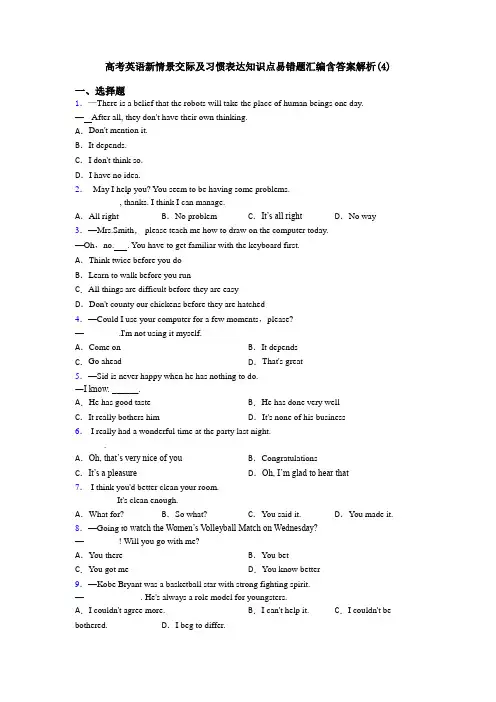
高考英语新情景交际及习惯表达知识点易错题汇编含答案解析(4)一、选择题1.—There is a belief that the robots will take the place of human beings one day.—After all, they don't have their own thinking.A.Don't mention it.B.It depends.C.I don't think so.D.I have no idea.2.- May I help you? You seem to be having some problems.- _________, thanks. I think I can manage.A.All right B.No problem C.It’s all right D.No way 3.—Mrs.Smith, please teach me how to draw on the computer today.—Oh,no. . You have to get familiar with the keyboard first.A.Think twice before you doB.Learn to walk before you runC.All things are difficult before they are easyD.Don't county our chickens before they are hatched4.—Could I use your computer for a few moments,please?—________.I'm not using it myself.A.Come on B.It dependsC.Go ahead D.That's great5.—Sid is never happy when he has nothing to do.―I know. ______.A.He has good taste B.He has done very wellC.It really bothers him D.It's none of his business6.-I really had a wonderful time at the party last night.-______.A.Oh, that’s very nice of you B.CongratulationsC.It’s a pleasure D.Oh, I’m glad to hear that7.-I think you'd better clean your room.-_________It's clean enough.A.What for?B.So what?C.You said it.D.You made it. 8.—Going t o watch the Women’s V olleyball Match on Wednesday?—________! Will you go with me?A.You there B.You betC.You got me D.You know better9.—Kobe Bryant was a basketball star with strong fighting spirit.—_____________. He's always a role model for youngsters.A.I couldn't agree more.B.I can't help it.C.I couldn't be bothered.D.I beg to differ.10.—Why didn’t you pay the accommodation rent?—The rent? That isn’t ________ till Sunday.A.sure B.okayC.due D.late11.—It is reported that the Shanghai auto show stops using models. How about yours?—We will_______.A.follow suitB.sink or swim togetherC.set eyes on itD.get to the bottom of it12.— We got through the most difficult times with their help.— . Those days are gone.A.You said it B.Keep it up C.That’s terrible D.Take your time 13.—Linda, would you like to come and taste the dishes I have cooked?—Don’t ______. You even don’t know how to fry an egg.A.rain cats and dogs B.pull my leg C.be all ears D.be all thumbs 14.—It’s reported that huma n got the first picture of a black hole on April 10, 2019.— ________A.Good news.B.All right.C.So what?D.How come? 15.—We are going to have a picnic this afternoon. Are you excited?—________.A.You know B.You bet C.You name it D.You mean it 16.—I’ve been promoted to the director of HR and I’m wondering whether I can ask for a big pay rise .—________. After all, the economy is struggling these days.A.You can make it.B.Good for you C.You’ve gone too far D.It’s up to you 17.—I lost five pounds just after a week on this new diet. It's definitely worth a try.—Right, _____. I definitely need to get in shape for my school reunion.A.You have my words B.I don’t buy it C.You’ve sold it to me D.I just can’t help it 18.—I feel terrible. I didn't do well in the physics test.—____________. You have already made progress and will surely learn it well.A.That' s right.B.It is impossible.C.That sounds crazy.D.Don' t take it too hard.19.—It’s very kind of you to give me a lift back home.—____________. I'm just driving your way.A.With pleasure B.It doesn't matter.C.That's right.D.Think nothing of it. 20.—We shouldn’t waste time on playing computers games or reading novels.—______. We’d better concentrate our attention to our study instead.A.I’d love to B.I’m with you on thatC.It’s up to you D.It’s my pleasure21.—The deadline is approaching and time is running out.—_______,or we won't complete the project in time.A.Come off it B.Take your timeC.Step on it D.Start from scratch22.—A second,please.I have another call coming through.—________.I’m not in a hurry.A.Enjoy yourself B.Leave me aloneC.Do as you like D.Take your time23.—Betty was feeling pretty blue for a while, but she’s better now.— _________.A.Congratulations B.It’s my pleasureC.Oh, tha t’s kind of you D.Oh, I’m glad to hear that24.—Let’s go for a picnic this weekend together with our classmates, OK?—_______. I love getting close to nature.A.I couldn’t agree more B.That’s all rightC.Out of the question D.I’m afraid not25.--Reading is the best way to pass time on the train.-- , I never go traveling without a book.A.You are joking B.That's trueC.I don't think so D.It sounds like fun【参考答案】***试卷处理标记,请不要删除一、选择题1.C解析:C【解析】【分析】【详解】考查情景交际。
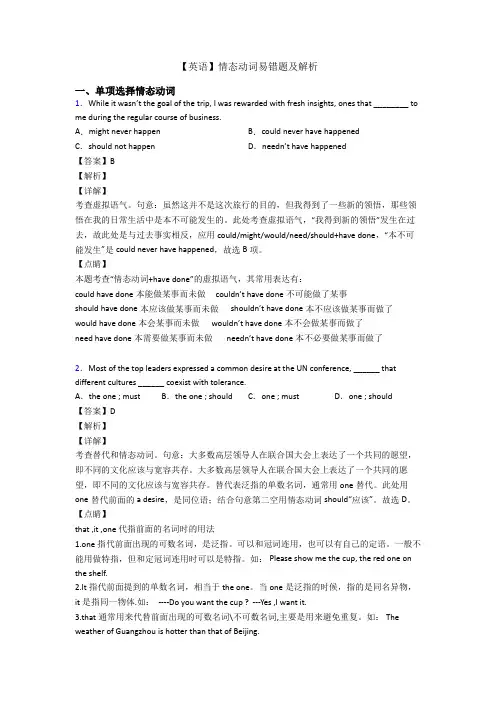
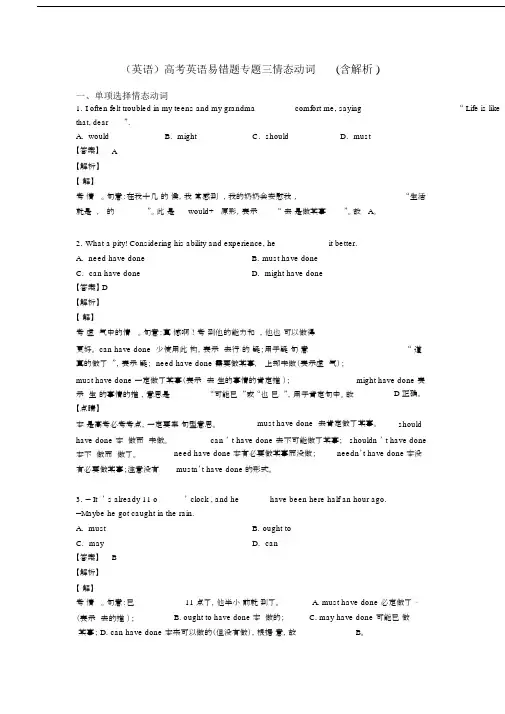
(英语)高考英语易错题专题三情态动词(含解析 )一、单项选择情态动词1.I often felt troubled in my teens and my grandma ________ comfort me, saying“ Life is like that, dear”.A. would B. might C. should D. must【答案】A【解析】【解】考情。
句意:在我十几的候,我常感到,我的奶奶会安慰我,“生活就是,的”。
此是would+ 原形,表示“ 去是做某事”。
故A。
2.What a pity! Considering his ability and experience, he ___________ it better.A. need have done B.must have doneC. can have done D. might have done【答案】 D【解析】【解】考虚气中的情。
句意:真憾啊!考到他的能力和,他也可以做得更好。
can have done 少使用此构,表示去行的疑;用于疑句意“ 道真的做了”,表示疑; need have done 需要做某事,上却未做(表示虚气);must have done 一定做了某事(表示去生的事情的肯定推);might have done 表示生的事情的推,意思是“可能已”或“也已”,用于肯定句中。
故 D 正确。
【点睛】本是高考必考考点,一定要牢句型意思。
must have done 去肯定做了某事。
shouldhave done 本做而未做。
can ’ t have done去不可能做了某事; shouldn ’ t have done本不做而做了。
need have done 本有必要做某事而没做;needn’t have done本没有必要做某事;注意没有mustn’t have done的形式。
3.— It ’ s already 11 o’ clock , and he ______ have been here half an hour ago.—Maybe he got caught in the rain.A. must C. may B.ought to D. can【答案】B 【解析】【解】考情。
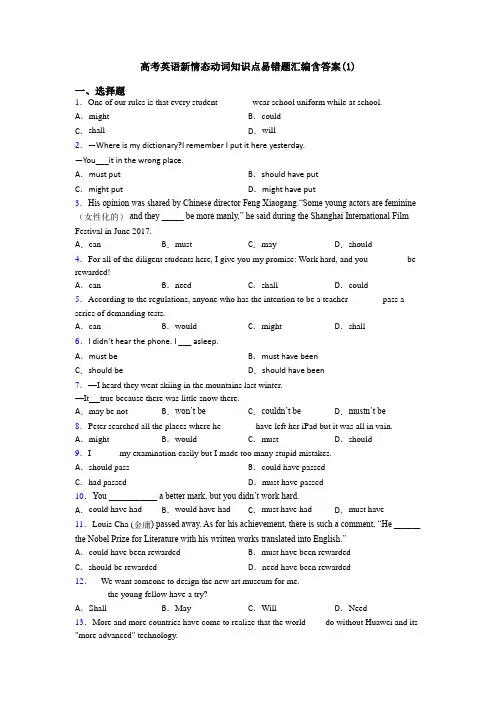
高考英语新情态动词知识点易错题汇编含答案(1)一、选择题1.One of our rules is that every student _______ wear school uniform while at school. A.might B.couldC.shall D.will2.—Where is my dictionary?I remember I put it here yesterday.—You___it in the wrong place.A.must put B.should have putC.might put D.might have put3.His opinion was shared by Chinese director Feng Xiaogang.“Some young actors are feminine (女性化的)and they _____ be more manly,” he said during the Shanghai International Film Festival in June 2017.A.can B.must C.may D.should4.For all of the diligent students here, I give you my promise: Work hard, and you ________ be rewarded!A.can B.need C.shall D.could 5.According to the regulations, anyone who has the intention to be a teacher _______ pass a series of demanding tests.A.can B.would C.might D.shall6.I didn’t hear the phone. I ___ asleep.A.must be B.must have beenC.should be D.should have been7.—I heard they went skiing in the mountains last winter.—It true because there was little snow there.A.may be not B.won’t be C.couldn’t be D.mustn’t be 8.Peter searched all the places where he________have left her iPad but it was all in vain. A.might B.would C.must D.should9.I ______my examination easily but I made too many stupid mistakes.A.should pass B.could have passedC.had passed D.must have passed10.You ___________ a better mark, but you didn’t work hard.A.could have had B.would have had C.must have had D.must have 11.Louis Cha (金庸) passed away. As for his achievement, there is such a comment, “He ______ the Nobel Prize for Literature with his written works translated into English.”A.could have been rewarded B.must have been rewardedC.should be rewarded D.need have been rewarded12.---We want someone to design the new art museum for me.---_____ the young fellow have a try?A.Shall B.May C.Will D.Need13.More and more countries have come to realize that the world____ do without Huawei and its "more advanced" technology.A.can’t B.needn’t C.mustn’t D.shouldn't 14.He did not regret saying what he did but felt that he _________ it differently.A.could express B.would expressC.could have expressed D.must have expressed15.(2018·北京) In today’s information age, the loss of data _________ cause serious problems for a company.A.need B.shouldC.can D.must16.— Do you know where David is? I couldn’t find him anywhere.— Well. He ________ have gone far — his coat is still here.A.shouldn’t B.mustn’t C.can’t D.wouldn’t 17.It’s nearly 7 o’clock. Jack ____________ be here at any moment.A.shall B.had toC.ought to D.have to18.He plays basketball very well. He_________ it a lot.A.may practise B.must practiseC.must have practised D.should have practiced19.I____________ go to a summer camp during the summer vacation, but I am not sure. A.might B.can C.must D.need20.—Is there a holiday recently?—There_____ be. It has been informed that we will continue to study for another three weeks. A.won’t B.mustn’t C.may not D.can’t21.As you worked late last night, you __________ have come this morning.A.may not B.can’t C.mustn’t D.needn’t 22.—Do you know where Tony is?—He _________ in the living room. I saw him there just now.A.shall be B.should have been C.might have been D.must be 23.The heavy rain may ______ the landslide last night.A.accounts for B.accounted forC.have accounted for D.accounting for24.Mr. White _______ to hospital for an examination yesterday but he was too busy to come. A.should come B.should have come C.should be coming D.should had come 25.She looks very happy. She_________ the exam.A.can have passed B.should have passed C.must have passed D.could have passed 【参考答案】***试卷处理标记,请不要删除一、选择题解析:C【解析】【分析】【详解】考查情态动词辨析。
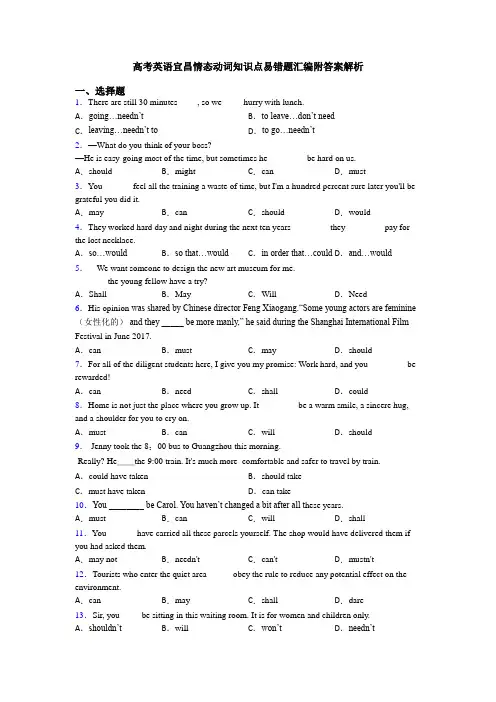
高考英语宜昌情态动词知识点易错题汇编附答案解析一、选择题1.There are still 30 minutes ____, so we ____ hurry with lunch.A.going…needn’t B.to leave…don’t need C.leaving…needn’t to D.to go…needn’t2.—What do you think of your boss?—He is easy-going most of the time, but sometimes he ________ be hard on us.A.should B.might C.can D.must3.You ______ feel all the training a waste of time, but I'm a hundred percent sure later you'll be grateful you did it.A.may B.can C.should D.would4.They worked hard day and night during the next ten years ________ they ________ pay for the lost necklace.A.so…would B.so that…would C.in order that…could D.and…would 5.---We want someone to design the new art museum for me.---_____ the young fellow have a try?A.Shall B.May C.Will D.Need6.His opinion was shared by Chinese director Feng Xiaogang.“Some young actors are feminine (女性化的)and they _____ be more manly,” he said during the Shanghai International Film Festival in June 2017.A.can B.must C.may D.should7.For all of the diligent students here, I give you my promise: Work hard, and you ________ be rewarded!A.can B.need C.shall D.could8.Home is not just the place where you grow up. It ________ be a warm smile, a sincere hug, and a shoulder for you to cry on.A.must B.can C.will D.should9.-Jenny took the 8:00 bus to Guangzhou this morning.-Really? He__the 9:00 train. It's much more comfortable and safer to travel by train. A.could have taken B.should takeC.must have taken D.can take10.You ________ be Carol. You haven’t changed a bit after all t hese years.A.must B.can C.will D.shall11.You ______ have carried all these parcels yourself. The shop would have delivered them if you had asked them.A.may not B.needn't C.can't D.mustn't 12.Tourists who enter the quiet area _____ obey the rule to reduce any potential effect on the environment.A.can B.may C.shall D.dare13.Sir, you ____ be sitting in this waiting room. It is for women and children only. A.shouldn’t B.will C.won’t D.needn’t14.He did not regret saying what he did but felt that he _________ it differently.A.could express B.would expressC.could have expressed D.must have expressed15.Mary is a bit shy and ____ a speech in public, which makes her lose the precious chance to do the voluntary job.A.dares not make B.doesn’t dare makeC.dare not to make D.dares not to make16.—You look so tired. You________ late last night.—Yes. I had to to do an important report and stayed up till I completed it.A.should sleep B.must sleepC.should have slept D.must have slept17.Louis Cha (金庸) passed away. As for his achievement, there is such a comment, “He ______ the Nobel Prize for Literature with his written works translated into English.”A.could have been rewarded B.must have been rewardedC.should be rewarded D.need have been rewarded18.She looks very happy. She_________ the exam.A.can have passed B.should have passed C.must have passed D.could have passed 19.Helen________ go on the trip with us, but she isn’t quite sure yet.A.shall B.may C.must D.can20.—Do you know where David is? I couldn’t fi nd him anywhere.— Well. He ________ have gone far — his coat is still here.A.shouldn’t B.mustn’t C.can’t D.wouldn’t21.I____________ go to a summer camp during the summer vacation, but I am not sure. A.might B.can C.must D.need22.It was so noisy that we hear ourselves speak.A.couldn’t B.shouldn’tC.mustn’t D.needn’t23.The heavy rain may ______ the landslide last night.A.accounts for B.accounted forC.have accounted for D.accounting for24.—May I smoke here?—If you _______, choose a seat in the smoking section.A.must B.should C.may D.can25.I didn’t hear the phone. I ___ asleep.A.must be B.must have beenC.should be D.should have been【参考答案】***试卷处理标记,请不要删除一、选择题1.D解析:D【解析】【分析】【详解】考查非谓语动词和情态动词。
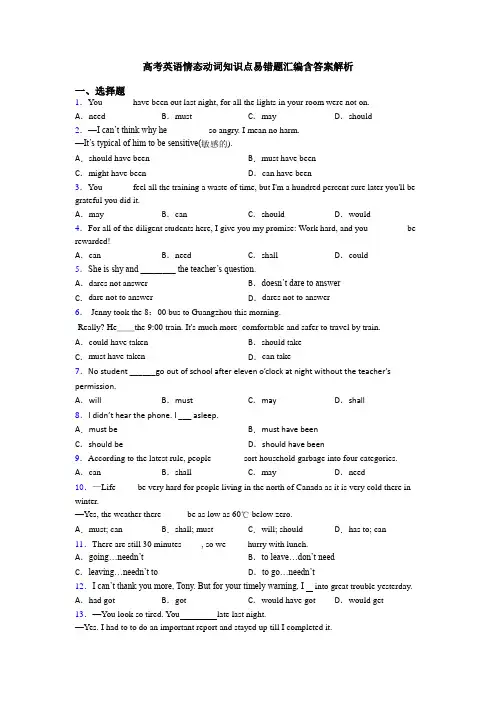
高考英语情态动词知识点易错题汇编含答案解析一、选择题1.You ______ have been out last night, for all the lights in your room were not on.A.need B.must C.may D.should2.—I can’t think why he________ so angry. I mean no harm.—It’s typical of him to be sensitive(敏感的).A.should have been B.must have beenC.might have been D.can have been3.You ______ feel all the training a waste of time, but I'm a hundred percent sure later you'll be grateful you did it.A.may B.can C.should D.would4.For all of the diligent students here, I give you my promise: Work hard, and you ________ be rewarded!A.can B.need C.shall D.could5.She is shy and ________ the teacher’s question.A.dares not answer B.doesn’t dare to answerC.dare not to answer D.dares not to answer6.-Jenny took the 8:00 bus to Guangzhou this morning.-Really? He__the 9:00 train. It's much more comfortable and safer to travel by train. A.could have taken B.should takeC.must have taken D.can take7.No student ______go out of school after eleven o’clock at night without the teacher’s permission.A.will B.must C.may D.shall8.I didn’t hear the phone. I ___ asleep.A.must be B.must have beenC.should be D.should have been9.According to the latest rule, people _______sort household garbage into four categories. A.can B.shall C.may D.need10.—Life ____ be very hard for people living in the north of Canada as it is very cold there in winter.—Yes, the weather there _____ be as low as 60℃ below zero.A.must; can B.shall; must C.will; should D.has to; can 11.There are still 30 minutes ____, so we ____ hurry with lunch.A.going…needn’t B.to leave…don’t need C.leaving…needn’t to D.to go…needn’t12.I can’t thank you more, Tony. But for your timely warning, I into great trouble yesterday. A.had got B.got C.would have got D.would get 13.—You look so tired. You________ late last night.—Yes. I had to to do an important report and stayed up till I completed it.A.should sleep B.must sleepC.should have slept D.must have slept14.—May I smoke here?—If you _______, choose a seat in the smoking section.A.must B.should C.may D.can 15.(2018·天津) I can't find my purse. I___________ it in the supermarket yesterday, but I'm not sure.A.should leave B.must have leftC.might leave D.could have left16.More and more countries have come to realize that the world____ do without Huawei and its "more advanced" technology.A.can’t B.needn’t C.mustn’t D.shouldn't 17.(2018·北京) In today’s information age, the loss of data _________ cause serious problems for a company.A.need B.shouldC.can D.must18.He ______ writi ng the paper now. He hadn’t written a single word when I left him ten minutes ago.A.shouldn’t be B.can’t have finishedC.can’t be D.mustn’t have finished19.The girl _________ out alone at night.A.dare not go B.dare not to go C.dares not go D.not dare go 20.You _________ me about it earlier, but you didn't.A.should have told B.would have toldC.must have told D.should tell21.It’s nearly 7 o’clock. Jack ____________ be here at any moment.A.shall B.had toC.ought to D.have to22.I____________ go to a summer camp during the summer vacation, but I am not sure. A.might B.can C.must D.need 23.—Sorry, Mum! I failed the job interview again.—Oh, it's too bad. You________ have made full preparations.A.must B.can C.would D.should24.You________have scolded him for his poor performance.After all,he had done his best. A.wouldn’t B.couldn’t C.mustn’t D.shouldn’t25.—I phoned you yesterday morning. A girl answered, but I didn’t recognize the voice.—Oh, it ________ my younger sister. She was in my room at that moment.A.must have been B.should have beenC.could have been D.may have been【参考答案】***试卷处理标记,请不要删除一、选择题1.B解析:B【解析】【详解】考查情态动词的用法。
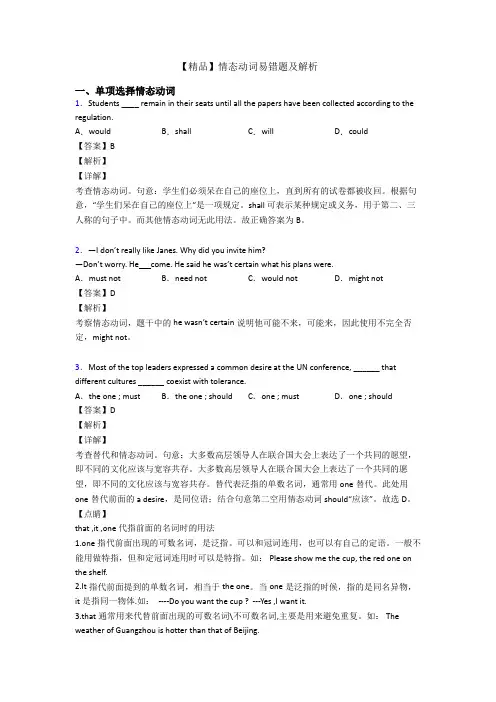
【精品】情态动词易错题及解析一、单项选择情态动词1.Students ____ remain in their seats until all the papers have been collected according to the regulation.A.would B.shall C.will D.could【答案】B【解析】【详解】考查情态动词。
句意:学生们必须呆在自己的座位上,直到所有的试卷都被收回。
根据句意,“学生们呆在自己的座位上”是一项规定。
shall 可表示某种规定或义务,用于第二、三人称的句子中。
而其他情态动词无此用法。
故正确答案为B。
2.—I don’t really like Janes. Why did you invite him?—Don’t worry. He come. He said he was’t certain what his plans were.A.must not B.need not C.would not D.might not【答案】D【解析】考察情态动词,题干中的he wasn’t certain说明他可能不来,可能来,因此使用不完全否定,might not。
3.Most of the top leaders expressed a common desire at the UN conference, ______ that different cultures ______ coexist with tolerance.A.the one ; must B.the one ; should C.one ; must D.one ; should【答案】D【解析】【详解】考查替代和情态动词。
句意:大多数高层领导人在联合国大会上表达了一个共同的愿望,即不同的文化应该与宽容共存。
大多数高层领导人在联合国大会上表达了一个共同的愿望,即不同的文化应该与宽容共存。
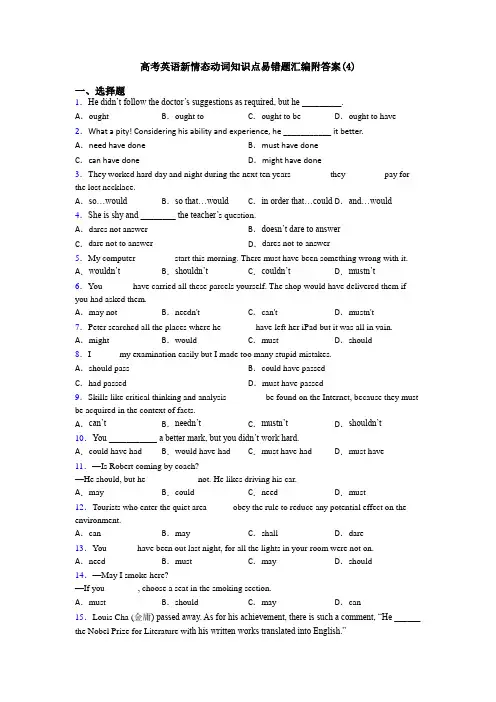
高考英语新情态动词知识点易错题汇编附答案(4)一、选择题1.He didn’t follow the doctor’s suggestions as required, but he _________.A.ought B.ought to C.ought to be D.ought to have 2.What a pity! Considering his ability and experience, he ___________ it better.A.need have done B.must have doneC.can have done D.might have done3.They worked hard day and night during the next ten years ________ they ________ pay for the lost necklace.A.so…would B.so that…would C.in order that…could D.and…would 4.She is shy and ________ the teacher’s question.A.dares not answer B.doesn’t dare to answerC.dare not to answer D.dares not to answer5.My computer ________ start this morning. There must have been something wrong with it. A.wouldn’t B.shouldn’t C.couldn’t D.mustn’t6.You ______ have carried all these parcels yourself. The shop would have delivered them if you had asked them.A.may not B.needn't C.can't D.mustn't7.Peter searched all the places where he________have left her iPad but it was all in vain. A.might B.would C.must D.should8.I ______my examination easily but I made too many stupid mistakes.A.should pass B.could have passedC.had passed D.must have passed9.Skills like critical thinking and analysis ________ be found on the Internet, because they must be acquired in the context of facts.A.can’t B.needn’t C.mustn’t D.shouldn’t10.You ___________ a better mark, but you didn’t work hard.A.could have had B.would have had C.must have had D.must have 11.—Is Robert coming by coach?—He should, but he ___________ not. He likes driving his car.A.may B.could C.need D.must 12.Tourists who enter the quiet area _____ obey the rule to reduce any potential effect on the environment.A.can B.may C.shall D.dare13.You ______ have been out last night, for all the lights in your room were not on.A.need B.must C.may D.should 14.—May I smoke here?—If you _______, choose a seat in the smoking section.A.must B.should C.may D.can15.Louis Cha (金庸) passed away. As for his achievement, there is such a comment, “He ______ the Nobel Prize for Literature wi th his written works translated into English.”A.could have been rewarded B.must have been rewardedC.should be rewarded D.need have been rewarded16.–Do you know where David is? He is not in the office.–Well, he ______ have gone far—his coat is still here.A.shouldn’t B.mustn’t C.can’t D.wouldn’t 17.She looks very happy. She_________ the exam.A.can have passed B.should have passed C.must have passed D.could have passed 18.He ______ writing the paper now. He hadn’t written a single word when I left him te n minutes ago.A.shouldn’t be B.can’t have finishedC.can’t be D.mustn’t have finished19.Tom told us that he ______ come to the party tonight, but he wasn’t sure about this. A.will B.would C.could D.might 20.Although passing the driving test ________ be d ifficult now, it’s worth the efforts. A.need B.shallC.can D.should21.—Peter, you delivered a wonderful speech today.—Thanks, but I think I ______ more attention to my stage manners during that time.A.must pay B.should payC.must have paid D.should have paid22.There’s no light on --- they _______ be at home.A.can’t B.mustn’t C.needn’t D.wouldn’t23.I _________ my driving test but I didn’t operate carefully.A.should pass B.may passC.might have passed D.might pass24.—Is there a holiday recently?—There_____ be. It has been informed that we will continue to study for another three weeks. A.won’t B.mustn’t C.may not D.can’t25.Mary is a bit shy and ____ a speech in public, which makes her lose the precious chance to do the voluntary job.A.dares not make B.doesn’t dare makeC.dare not to make D.dares not to make【参考答案】***试卷处理标记,请不要删除一、选择题1.D解析:D【解析】考查情态动词。
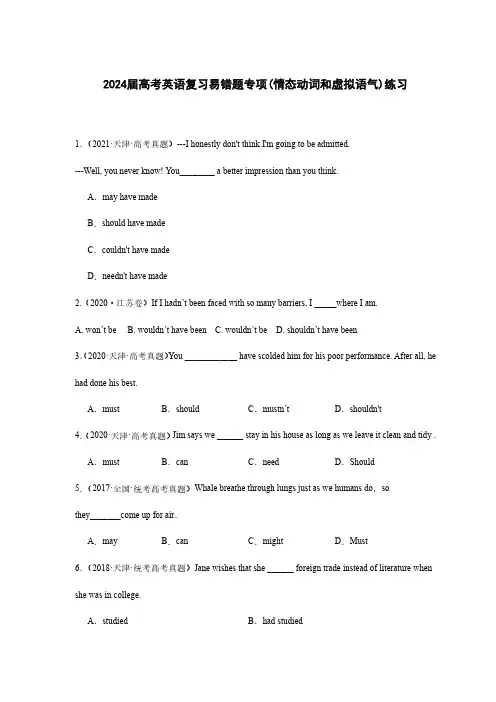
2024届高考英语复习易错题专项(情态动词和虚拟语气)练习1.(2021ꞏ天津ꞏ高考真题)---I honestly don't think I'm going to be admitted.---Well, you never know! You________ a better impression than you think.A.may have madeB.should have madeC.couldn't have madeD.needn't have made2.(2020·江苏卷)If I hadn’t been faced with so many barriers, I _____where I am.A. won’t beB. wouldn’t have beenC. wouldn’t beD. shouldn’t have been3.(2020ꞏ天津ꞏ高考真题)You ____________ have scolded him for his poor performance. After all, he had done his best.A.must B.should C.mustn’t D.shouldn't4.(2020ꞏ天津ꞏ高考真题)Jim says we ______ stay in his house as long as we leave it clean and tidy .A.must B.can C.need D.Should5.(2017ꞏ全国ꞏ统考高考真题)Whale breathe through lungs just as we humans do,sothey_______come up for air.A.may B.can C.might D.Must6.(2018ꞏ天津ꞏ统考高考真题)Jane wishes that she ______ foreign trade instead of literature when she was in college.A.studied B.had studiedC.would study D.might have studied7.(2019ꞏ江苏ꞏ高考真题)What a pity! You missed the sightseeing, or we ________ a good time together.A.had B.will have C.would have had D.had had8.(2023ꞏ天津ꞏ高三耀华中学校考开学考试)—Why you be talking so loudly while others are studying?—I’m terribly sorry.A.shall B.must C.will D.May9.(2023ꞏ天津滨海新ꞏ统考三模)Waking up suddenly________lead to rapid heart rate and high blood pressure.A.must B.would C.can D.Shall10.(2023秋ꞏ高三课前预习)—Finish the homework in half an hour! Mom, you________be joking! — Nothing is impossible if you put your heart into it.A.need B.can C.must D.May11.(2023ꞏ天津河东ꞏ统考二模)“Those responsible for the accident be punished while those contributing to solving the problems be rewarded.” promised the official then and there.A.need B.shall C.must D.Should12.(2023ꞏ全国ꞏ高三专题练习)My little son _____ out alone at night.A.dares not go B.dares not to goC.dare not to go D.doesn’t dare to go13.(2023ꞏ天津滨海新ꞏ高三大港一中校考期末)The world went into shock, most people havingassumed that this space flight ________ be more dangerous than travelling in an aeroplane.A.should B.shall C.would D.Could14.(2023ꞏ天津河东ꞏ高三统考期末)If there is nothing more to do, we ________ as well go to bed.A.should B.can C.would D.May15.(2023ꞏ天津ꞏ高三天津市咸水沽第一中学校考期末)I ______ James some advice, but I didn’t think he would accept it under those conditions.A.could have given B.mustn’t giveC.couldn’t give D.must have given参考答案1.(2021ꞏ天津ꞏ高考真题)---I honestly don't think I'm going to be admitted.---Well, you never know! You________ a better impression than you think.A.may have madeB.should have madeC.couldn't have madeD.needn't have made【答案】A【答案解析】考查情态动词用法。
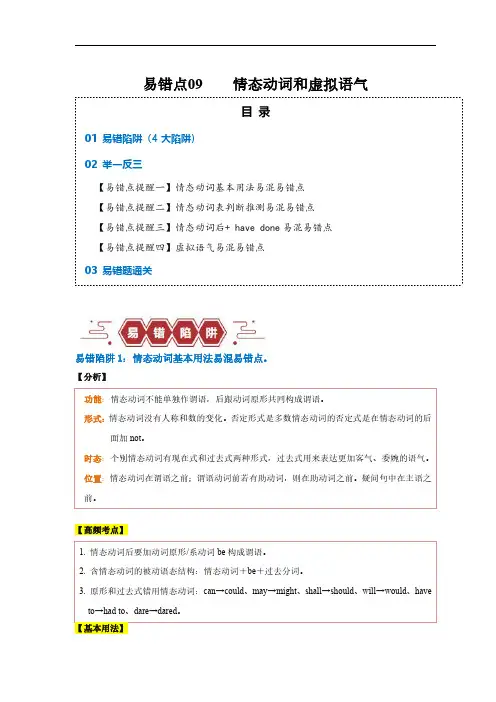
易错点09情态动词和虚拟语气目录01易错陷阱(4大陷阱)02举一反三【易错点提醒一】情态动词基本用法易混易错点【易错点提醒二】情态动词表判断推测易混易错点【易错点提醒三】情态动词后+have done易混易错点【易错点提醒四】虚拟语气易混易错点03易错题通关易错陷阱1:情态动词基本用法易混易错点。
【分析】功能:情态动词不能单独作谓语,后跟动词原形共同构成谓语。
形式:情态动词没有人称和数的变化。
否定形式是多数情态动词的否定式是在情态动词的后面加not。
时态:个别情态动词有现在式和过去式两种形式,过去式用来表达更加客气、委婉的语气。
位置:情态动词在谓语之前;谓语动词前若有助动词,则在助动词之前。
疑问句中在主语之前。
【高频考点】1.can/could表能力、请求、可能性(表示可能性用于否定句及疑问句中);特殊句型:can not...too.../enough(再怎么……也不过分)、can't help but do sth.(不得不做某事)、can't wait to do sth.(迫不及待地做某事)。
2.may/might表较小的可能性;表示请求许可以及祝愿。
句型和搭配:may/might as well do表示“还是……好;最好……”;may well do表示“很可能”;may可以用来表示祝愿,用“may+主语+动词原形”结构。
May you succeed.祝你成功。
3.must表示非常肯定的推测;表“偏要;非要……不可”;mustn't意为“禁止”,表示“不必”应用needn't。
4.shall的用法用于第二、三人称的陈述句中,表命令、警告、许诺或威胁等,语气强于should;用于第一、三人称的疑问句中,表示征询意见。
5.should/ought toshould表责任、义务、劝告、建议等,意为“应该”,还可表出乎意料的语气,意为“竟然”;ought to表义务或责任,意为“应该”。
高考英语新情态动词知识点易错题汇编附答案解析(3)一、选择题1.She looks very happy. She_________ the exam.A.can have passed B.should have passed C.must have passed D.could have passed 2.——I called you last night, but no one answered.——Sorry, I____________ sleeping.A.need have been B.would have been C.must have been D.should have been 3.You ______ feel all the training a waste of time, but I'm a hundred percent sure later you'll be grateful you did it.A.may B.can C.should D.would4.His opinion was shared by Chinese director Feng Xiaogang.“Some young actors are feminine (女性化的)and they _____ be more manly,” he said during the Shanghai International Film Festival in June 2017.A.can B.must C.may D.should5.—It’s so hot and uncomfortable here! Why are your windows still closed?—Oh, I’m not to blame. They ________ open.A.shan’t B.mustn’t C.won’t D.wouldn’t6.No student ______go out of school after eleven o’clock at night without the teacher’s permission.A.will B.must C.may D.shall7.I didn’t hear the phone. I ___ asleep.A.must be B.must have beenC.should be D.should have been8.—I heard they went skiing in the mountains last winter.—It true because there was little snow there.A.may be not B.won’t be C.couldn’t be D.mustn’t be9.I ______my examination easily but I made too many stupid mistakes.A.should pass B.could have passedC.had passed D.must have passed10.Although you ______ find bargains in London, it’s not generally a cheap place to shop. A.should B.need C.must D.can11.Sir, you ____ be sitting in this waiting room. It is for women and children only. A.shouldn’t B.will C.won’t D.needn’t 12.Schools have been lengthening the school day to raise test marks, which ________ be costly if schools need air conditioning on hot days.A.might B.can C.dare D.need13.–Do you know where David is? He is not in the office.–Well, he ______ have gone far—his coat is still here.A.shouldn’t B.mustn’t C.can’t D.wouldn’t 14.—Sorry, Mum! I failed the job interview again.—Oh, it's too bad. You________ have made full preparations.A.must B.can C.would D.should15.One of our rules is that every student _______ wear school uniform while at school. A.might B.couldC.shall D.will16.—Do you know where David is? I couldn’t find him anywhere.— Well. He ________ have gone far — his coat is still here.A.shouldn’t B.mustn’t C.can’t D.wouldn’t 17.You _________ me about it earlier, but you didn't.A.should have told B.would have toldC.must have told D.should tell18.Tom told us that he ______ come to the party tonight, but he wasn’t sure about this.A.will B.would C.could D.might 19.Although passing the driving test ________ be difficult now, it’s worth the efforts. A.need B.shallC.can D.should20.It’s nearly 7 o’clock. Jack ____________ be here at any moment.A.shall B.had toC.ought to D.have to21.—Can I inform my best friends of the result?—No, I want to keep it a secret . You ____tell anyone.A.won't B.don't have to C.mustn't D.don't need to 22.—Jane, why don’t you take a bite of the chocolate?—Well, I am on diet, if you __________know.A.must B.shall C.would D.could23.Word that you _________ enjoy a three-day holiday has come if you do complete the task on time.A.may B.should C.could D.shall24.As you worked late last night, you __________ have come this morning.A.may not B.can’t C.mustn’t D.needn’t25.He didn’t follow the doctor’s suggestions as required, but he _________.A.ought B.ought to C.ought to be D.ought to have 【参考答案】***试卷处理标记,请不要删除一、选择题1.C解析:C【解析】【分析】【详解】考查情态动词。
高考英语新情态动词知识点易错题汇编附答案一、选择题1.—Life ____ be very hard for people living in the north of Canada as it is very cold there in winter.—Yes, the weather there _____ be as low as 60℃ below zero.A.must; can B.shall; must C.will; should D.has to; can2.—I can’t think why he________ so angry. I mean no harm.—It’s typical of him to be sensitive(敏感的).A.should have been B.must have beenC.might have been D.can have been3.Schools have been lengthening the school day to raise test marks, which ________ be costly if schools need air conditioning on hot days.A.might B.can C.dare D.need4.——I called you last night, but no one answered.——Sorry, I____________ sleeping.A.need have been B.would have been C.must have been D.should have been 5.—What do you think of your boss?—He is easy-going most of the time, but sometimes he ________ be hard on us.A.should B.might C.can D.must6.You ______ feel all the training a waste of time, but I'm a hundred percent sure later you'll be grateful you did it.A.may B.can C.should D.would7.For all of the diligent students here, I give you my promise: Work hard, and you ________ be rewarded!A.can B.need C.shall D.could8.Home is not just the place where you grow up. It ________ be a warm smile, a sincere hug, and a shoulder for you to cry on.A.must B.can C.will D.should9.If you behave well from now on, you ___ have an Apple Watch for your 18th birthday. A.will B.shall C.can D.must10.--Is Jack still in hospital?--Yes. He _________ the bad food.A.wouldn’t eat B.shouldn’t eatC.woul dn’t have eaten D.shouldn’t have eaten11.According to the latest rule, people _______sort household garbage into four categories. A.can B.shall C.may D.need12.I can’t thank you more, Tony. But for your timely warning, I into great trouble yesterday. A.had got B.got C.would have got D.would get13.It ___________ last night, for the road was very muddy.A.would have rained B.must have rained C.should have rained D.must rain14.He did not regret saying what he did but felt that he _________ it differently.A.could express B.would expressC.could have expressed D.must have expressed15.There are still 30 minutes ____, so we ____ hurry with lunch.A.going…needn’t B.to leave…don’t need C.leaving…needn’t to D.to go…needn’t16.—You look so tired. You________ late last night.—Yes. I had to to do an important report and stayed up till I completed it.A.should sleep B.must sleepC.should have slept D.must have slept17.He didn’t follow the doctor’s suggestions as required, but he _________.A.ought B.ought to C.ought to be D.ought to have 18.—I’m sorry, I ________ have been so rude to you that way.—Forget it, but I was a bit out of control yesterday.A.mustn’t B.shouldn’tC.couldn’t D.needn’t19.One of our rules is that every student _______ wear school uniform while at school. A.might B.couldC.shall D.will20.The weather turned out to be fine yesterday. I ____________ the trouble to carry my umbrella with me.A.should have taken B.could have takenC.needn’t have taken D.mustn’t have taken21.The girl _________ out alone at night.A.dare not go B.dare not to go C.dares not go D.not dare go 22.—Is there a holiday recently?—There_____ be. It has been informed that we will continue to study for another three weeks. A.won’t B.mustn’t C.may not D.can’t23.As you worked late last night, you __________ have come this morning.A.may not B.can’t C.mustn’t D.needn’t 24.—Sorry, Mum! I failed the job interview again.—Oh, it's too bad. You________ have made full preparations.A.must B.can C.would D.should 25.Skills like critical thinking and analysis ________ be found on the Internet, because they must be acquired in the context of facts.A.can’t B.needn’t C.mustn’t D.shouldn’t 【参考答案】***试卷处理标记,请不要删除一、选择题解析:A【解析】【详解】考查情态动词。
高考情态动词易错题解析一、选择题1.It’s amazing that the pen ________turn voice into text with few mistakes.A.can B.must C.may D.need2.Think twice before making a decision, or you __________ get into trouble.A.may B.can't C.shouldn't D.mustn't 3.—Hurry up, Jack! Let’s cross the road as fast as possible.—No, you ________. Don’t you see the light is still red?A.couldn’t B.wouldn’t C.mustn’t D.needn’t 4.—There is a knock at the door.—It ________ be my mom. She always comes back home at this time.A.may B.may not C.must D.can’t 5.—Dad, must we wait until the light becomes green?—Yes, I am afraid we ________. That’s the traffic rule.A.may B.can C.have to D.need6.You ________ write the report again because spelling mistakes are not allowed at all. A.must B.can C.may D.could7.You'd better __________ hard from now on, __________ you will fail the exam. A.work; and B.working; or C.working; and D.work; or 8.When you visit a museum, some instructions should ________ and we’d better not ________ them.A.pay attention to; be against B.be paid attention; againstC.be paid attention to; against D.be paid attention to; be against9.—I must go to school today, ________?—No, you ________.You can go as soon as you get well.A.mustn’t I;needn’t B.needn’t I;needn’tC.mustn’t I;mustn’t D.needn’t I;mustn’t10.A lot of online resources ________ be used either by teachers at school or parents at home. A.can B.should C.need D.must11.You ________ require others to do with the problem like you. Everyone has his own way. A.mustn’t B.needn’t C.may not D.shouldn’t 12.— Zoe, what do you think is the greatest advantage of shopping online?— At least I ______ spend much time going from shop to shop.A.shouldn’t B.can’t C.needn’t D.mustn’t 13.—Have you decided to take up teaching as career after graduation?—I ________ go abroad for further education instead. But it depends.A.must B.should C.may D.shall 14.Please don't make so much noise. I ________ hear the speaker very well.A.needn't B.can't C.shouldn't D.mustn't15.The boy is very brave.I ________ he ________ the tall tree.A.dare say; dares to climbB.dare to say; dare climbingC.dare saying; dares climbD.dare to say; dares climbed16.—Amy, I hear you've got many foreign coins._______ I have a look?—Of course, I'll fetch them for you.A.May B.MustC.Should D.Need17.—Shall we go camping this summer holiday?—Nothing________be better.A.should B.could C.must D.may 18.—Ready? Let’s get started, Martin.— Swimming? I just ________ get used to it in winter.A.can’t B.needn’t C.mustn’t D.should n’t 19.—Will your mother be at home this Saturday?—Hard to say. She _______go to the countryside to see my grandparents.A.must B.may C.can D.would20.I ________ hear you clearly. Would you please repeat it?A.mustn’t B.can’t C.needn’t D.shouldn’t 21.Mr. Black ________ be at home now. He went abroad on vacation last Friday.A.can’t B.mustn’t C.needn’t D.shouldn’t 22.—What is that young lady’s job?—She ________ be a nurse, I’m not sure.A.must B.may C.need D.would 23.According to the rule, used batteries ________ be dropped in the red bin for harmful wastes. A.may B.would C.should D.might24.— Mum, why do I have to wash hands so many times a day?—You ________ be too careful, for your health.A.can’t B.mustn’t C.may not D.needn’t 25.—Will Jim come to Yangzhou for a holiday?—He ________come and it depends on how much homework he will have.A.may B.should C.must D.need26.—In China, many parents complain that their children have to stay up late to do the homework.—Don’t worry. The government has realized the problem. I’m sure there ________ be good news soon.A.can B.should C.need D.must27.You ________ pay too much attention to protecting yourself if you plan to go abroad. A.mustn’t B.can’t C.shouldn’t D.needn’t 28.—Shall I tell him the change of the time right now?—I’m afraid you ________, otherwise he will be late for the meeting.A.can B.may C.must D.need29.— Excuse me, could you tell me where the Nanjing Brocade Museum is?—Go along this road for five minutes. You ________ miss it. It’s a huge build ing. A.mustn’t B.can’t C.needn’t D.shouldn’t 30.Sometimes smiles ________ be false, hiding other feelings like anger, fear or worry. A.should B.would C.must D.can31.A hard-working man ________ become a great scientist, but a great scientist ________ be a hard-working man.A.can’t; can B.may not; must C.can’t; must D.may not; can 32.— The sandstorm in Beijing is so serious this year.— Yes, I wonder when we ________ worry about the air we breathe.A.can’t B.mustn’t C.needn’t D.shouldn’t 33.—Could you tell me how to renew the library books?—With pleasure. You ________ come to our desk every time. It’s easier to renew them online. A.can’t B.mustn’t C.needn’t D.shouldn’t 34.For the safety of the passengers, objects like guns ________ be carried on board.A.may not B.needn’t C.might not D.mustn’t 35.—Who’s the man over there? Is that Mr. Black?—It ________ be him. Mr. Black is much taller than that man.A.may B.must C.can’t D.mustn’t 36.—________ I see your ID card? We have to check your personal information.—Sure. Here you are.A.May B.Need C.Should D.Must37.—Is it really necessary for me to go shopping with a mask on?—I’m afraid you ________ in public. It is not only to protect yourself but also to protect others. A.must B.should C.can D.need 38.—Who is singing next door? It sounds like a young girl’s voice.—It _________ be Jane. But she seldom sings English songs.A.need B.must C.may D.can39.To avoid ________, we’d better ________ the parents’ meeting online.A.gather; hold B.gathering; hold C.gather; holding D.to gather; to hold 40.—Will dad arrive home at 6 o’clock to have dinner with us this evening?— I think he will, but he ________ not. Sometimes he works extra hours.A.can B.must C.need D.may【参考答案】一、选择题1.A解析:A【详解】句意:神奇的是,这支笔能把声音转换成文字,而且很少出错。
高考英语新情态动词知识点真题汇编附答案解析(4)一、选择题1.She looks very happy. She_________ the exam.A.can have passed B.should have passed C.must have passed D.could have passed 2.Tourists who enter the quiet area _____ obey the rule to reduce any potential effect on the environment.A.can B.may C.shall D.dare3.—Can I pay the bill by check?—Sorry,sir.But it is the management rules of our hotel that payment _____ be made in cash.A.shall B.needC.will D.can4.—Look at these tracks. It ________ be a wolf. I’m sure about it.—You are right! We have to be careful.A.may B.must C.can’t D.shouldn’t5.You ________ give me a lift. I want to walk home for exercise.A.needn’t B.couldn’t C.can’t D.mustn’t6.You ______ have carried all these parcels yourself. The shop would have delivered them if you had asked them.A.may not B.needn't C.can't D.mustn't7.Peter searched all the places where he________have left her iPad but it was all in vain. A.might B.would C.must D.should 8.According to the latest rule, people _______sort household garbage into four categories. A.can B.shall C.may D.need9.Skills like critical thinking and analysis ________ be found on the Internet, because they must be acquired in the context of facts.A.can’t B.needn’t C.mustn’t D.shouldn’t10.It ___________ last night, for the road was very muddy.A.would have rained B.must have rained C.should have rained D.must rain 11.Sir, you ____ be sitting in this waiting room. It is for women and children only. A.shouldn’t B.will C.won’t D.needn’t 12.Schools have been lengthening the school day to raise test marks, which ________ be costly if schools need air conditioning on hot days.A.might B.can C.dare D.need13.—I phoned you yesterday morning. A girl answered, but I didn’t recognize the voice.—Oh, it ________ my younger sister. She was in my room at that moment.A.must have been B.should have beenC.could have been D.may have been14.It was so noisy that we hear ourselves speak.A.couldn’t B.shouldn’tC.mustn’t D.needn’t15.You _________ me about it earlier, but you didn't.A.should have told B.would have toldC.must have told D.should tell16.Tom told us that he ______ come to the party tonight, but he wasn’t sure about this. A.will B.would C.could D.might 17.Although passing the driving test ________ be difficult now, i t’s worth the efforts. A.need B.shallC.can D.should18.It’s nearly 7 o’clock. Jack ____________ be here at any moment.A.shall B.had toC.ought to D.have to19.—Peter, you delivered a wonderful speech today.—Thanks, but I think I ______ more attention to my stage manners during that time. A.must pay B.should payC.must have paid D.should have paid20.—Can I inform my best friends of the result?—No, I want to keep it a secret . You ____tell anyone.A.won't B.don't have to C.mustn't D.don't need to 21.—Jan e, why don’t you take a bite of the chocolate?—Well, I am on diet, if you __________know.A.must B.shall C.would D.could22.I _________ my driving test but I didn’t operate carefully.A.should pass B.may passC.might have passed D.might pass23.—Is there a holiday recently?—There_____ be. It has been informed that we will continue to study for another three weeks. A.won’t B.mustn’t C.may not D.can’t 24.—Do you know where Tony is?—He _________ in the living room. I saw him there just now.A.shall be B.should have been C.might have been D.must be 25.There are still 30 minutes ____, so we ____ hurry with lunch.A.going…needn’t B.to leave…don’t need C.leaving…needn’t to D.to go…needn’t【参考答案】***试卷处理标记,请不要删除一、选择题1.C解析:C【解析】【分析】【详解】考查情态动词。
高考英语新情态动词知识点易错题汇编及解析(4)一、选择题1.You ______ have been out last night, for all the lights in your room were not on.A.need B.must C.may D.should2.—I can’t think why he________ so angry. I mean no harm.—It’s typical of him to be sensitive(敏感的).A.should have been B.must have beenC.might have been D.can have been3.Tourists who enter the quiet area _____ obey the rule to reduce any potential effect on the environment.A.can B.may C.shall D.dare4.—Look at these tracks. It ________ be a wolf. I’m sure about it.—You are right! We have to be careful.A.may B.must C.can’t D.shouldn’t 5.—What do you think of your boss?—He is easy-going most of the time, but sometimes he ________ be hard on us.A.should B.might C.can D.must6.They worked hard day and night during the next ten years ________ they ________ pay for the lost necklace.A.so…would B.so that…would C.in order that…could D.and…would 7.—Where is my dictionary?I remember I put it here yesterday.—You___it in the wrong place.A.must put B.should have putC.might put D.might have put8.According to the regulations, anyone who has the intention to be a teacher _______ pass a series of demanding tests.A.can B.would C.might D.shall9.-Jenny took the 8:00 bus to Guangzhou this morning.-Really? He__the 9:00 train. It's much more comfortable and safer to travel by train. A.could have taken B.should takeC.must have taken D.can take10.—I heard they went skiing in the mountains last winter.—It true because there was little snow there.A.may be not B.won’t be C.couldn’t be D.mustn’t be 11.—Is Robert coming by coach?—He should, but he ___________ not. He likes driving his car.A.may B.could C.need D.must12.I can’t thank you more, Tony. But for your timely warning, I into great trouble yesterday. A.had got B.got C.would have got D.would get 13.—I phoned you yesterday morning. A girl answered, but I didn’t recognize the voice.—Oh, it ________ my younger sister. She was in my room at that moment.A.must have been B.should have beenC.could have been D.may have been14.Mr. White _______ to hospital for an examination yesterday but he was too busy to come. A.should come B.should have come C.should be coming D.should had come 15.He didn’t follow the doctor’s suggestions as required, but he _________.A.ought B.ought to C.ought to be D.ought to have 16.One of our rules is that every student _______ wear school uniform while at school. A.might B.couldC.shall D.will17.(2018·北京) In today’s information age, the loss of data _________ cause serious problems for a company.A.need B.shouldC.can D.must18.Although passing the driving test ________ be difficult now, it’s worth the efforts. A.need B.shallC.can D.should19.We lost our way in that small village, otherwise we ________more places of interest yesterday.A.visited B.had visitedC.would visit D.would have visited20.—Peter, you delivered a wonderful speech today.—Thanks, but I think I ______ more attention to my stage manners during that time.A.must pay B.should payC.must have paid D.should have paid21.—Jane, why don’t you take a bite of the chocolate?—Well, I am on diet, if you __________know.A.must B.shall C.would D.could22.I____________ go to a summer camp during the summer vacation, but I am not sure. A.might B.can C.must D.need23.I _________ my drivin g test but I didn’t operate carefully.A.should pass B.may passC.might have passed D.might pass24.—Do you know where Tony is?—He _________ in the living room. I saw him there just now.A.shall be B.should have been C.might have been D.must be 25.Sir, you ____ be sitting in this waiting room. It is for women and children only. A.shouldn’t B.will C.won’t D.needn’t【参考答案】***试卷处理标记,请不要删除1.B解析:B【解析】【详解】考查情态动词的用法。
高考英语最新情态动词知识点易错题汇编含答案一、选择题1.You ______ have been out last night, for all the lights in your room were not on.A.need B.must C.may D.should 2.—What do you think of your boss?—He is easy-going most of the time, but sometimes he ________ be hard on us.A.should B.might C.can D.must3.You ______ feel all the training a waste of time, but I'm a hundred percent sure later you'll be grateful you did it.A.may B.can C.should D.would4.They worked hard day and night during the next ten years ________ they ________ pay for the lost necklace.A.so…would B.so that…would C.in order that…could D.and…would 5.Home is not just the place where you grow up. It ________ be a warm smile, a sincere hug, and a shoulder for you to cry on.A.must B.can C.will D.should6.If you behave well from now on, you ___ have an Apple Watch for your 18th birthday. A.will B.shall C.can D.must7.You ________ be Carol. You haven’t changed a bit after all these years.A.must B.can C.will D.shall8.You ______ have carried all these parcels yourself. The shop would have delivered them if you had asked them.A.may not B.needn't C.can't D.mustn't9.I didn’t hear the phone. I ___ asleep.A.must be B.must have beenC.should be D.should have been10.Hurry up! Tom _______ for us at the gate.A.must wait B.must be waitingC.can be waiting D.must have waited11.—Life ____ be very hard for people living in the north of Canada as it is very cold there in winter.—Yes, the weather there _____ be as low as 60℃ below zero.A.must; can B.shall; must C.will; should D.has to; can 12.Schools have been lengthening the school day to raise test marks, which ________ be costly if schools need air conditioning on hot days.A.might B.can C.dare D.need13.—You look so tired. You________ late last night.—Yes. I had to to do an important report and stayed up till I completed it.A.should sleep B.must sleepC.should have slept D.must have slept14.You________have scolded him for his poor performance.After all,he had done his best.A.wouldn’t B.couldn’t C.mustn’t D.shouldn’t15.–Do you know where David is? He is not in the office.–Well, he ______ have gone far—his coat is still here.A.shouldn’t B.mustn’t C.can’t D.wouldn’t 16.One of our rules is that every student _______ wear school uniform while at school. A.might B.couldC.shall D.will17.You _________ me about it earlier, but you didn't.A.should have told B.would have toldC.must have told D.should tell18.— Did Bob take the job in the supermarket? — No, but I think he _________.A.will have B.may have C.should have D.must have 19.We lost our way in that small village, otherwise we ________more places of interest yesterday.A.visited B.had visitedC.would visit D.would have visited20.—Peter, you delivered a wonderful speech today.—Thanks, but I think I ______ more attention to my stage manners during that time.A.must pay B.should payC.must have paid D.should have paid21.Word that you _________ enjoy a three-day holiday has come if you do complete the task on time.A.may B.should C.could D.shall22.As you worked late last night, you __________ have come this morning.A.may not B.can’t C.mustn’t D.needn’t 23.—Sorry, Mum! I failed the job interview again.—Oh, it's too bad. You________ have made full preparations.A.must B.can C.would D.should24.It was so noisy that we hear ourselves speak.A.couldn’t B.shouldn’tC.mustn’t D.needn’t25.You don’t look well, you __________ see the doctor.A.ought to B.mayC.can D.might【参考答案】***试卷处理标记,请不要删除一、选择题1.B解析:B【解析】【详解】考查情态动词的用法。
高考英语新情态动词知识点易错题汇编及答案解析(4)一、选择题1.You ______ have been out last night, for all the lights in your room were not on.A.need B.must C.may D.should2.---We want someone to design the new art museum for me.---_____ the young fellow have a try?A.Shall B.May C.Will D.Need3.If you behave well from now on, you ___ have an Apple Watch for your 18th birthday. A.will B.shall C.can D.must4.You ________ give me a lift. I want to walk home for exercise.A.needn’t B.couldn’t C.can’t D.mustn’t 5.According to the regulations, anyone who has the intention to be a teacher _______ pass a series of demanding tests.A.can B.would C.might D.shall6.–Will you read me a story, Mummy?--OK. You ______have one if you go to bed as soon as possible.A.might B.must C.could D.shall7.I didn’t hear the phone. I ___ asleep.A.must be B.must have beenC.should be D.should have been8.—Isn’t that Ann’s husband over there?— No, it ________ be him —I’m sure he doesn’t wear glasses.A.must not B.can’t C.won’t D.may not 9.Hurry up! Tom _______ for us at the gate.A.must wait B.must be waitingC.can be waiting D.must have waited10.It ___________ last night, for the road was very muddy.A.would have rained B.must have rained C.should have rained D.must rain 11.—Life ____ be very hard for people living in the north of Canada as it is very cold there in winter.—Yes, the weather there _____ be as low as 60℃ below zero.A.must; can B.shall; must C.will; should D.has to; can 12.——I called you last night, but no one answered.——Sorry, I____________ sleeping.A.need have been B.would have been C.must have been D.should have been 13.—You look so tired. You________ late last night.—Yes. I had to to do an important report and stayed up till I completed it.A.should sleep B.must sleepC.should have slept D.must have slept14.—May I smoke here?—If you _______, choose a seat in the smoking section.A.must B.should C.may D.can15.–Do you know where David is? He is not in the office.–Well, he ______ have gone far—his coat is still here.A.shouldn’t B.mu stn’t C.can’t D.wouldn’t16.He ______ writing the paper now. He hadn’t written a single word when I left him ten minutes ago.A.shouldn’t be B.can’t have finishedC.can’t be D.mustn’t have finished17.The weather turned out to be fine yesterday. I ____________ the trouble to carry my umbrella with me.A.should have taken B.could have takenC.needn’t have taken D.mustn’t have taken18.------ Tom is never late for work. Why is he absent today?------ Something _________ to him.A.must happen B.should have happenedC.could have happened D.must have happened19.We lost our way in that small village, otherwise we ________more places of interest yesterday.A.visited B.had visitedC.would visit D.would have visited20.—Peter, you delivered a wonderful speech today.—Thanks, but I think I ______ more attention to my stage manners during that time.A.must pay B.should payC.must have paid D.should have paid21.—Can I inform my best friends of the result?—No, I want to keep it a secret . You ____tell anyone.A.won't B.don't have to C.mustn't D.don't need to 22.—Jane, why don’t you take a bite of the chocolate?—Well, I am on diet, if you __________know.A.must B.shall C.would D.could23.Word that you _________ enjoy a three-day holiday has come if you do complete the task on time.A.may B.should C.could D.shall24.As you worked late last night, you __________ have come this morning.A.may not B.can’t C.mustn’t D.needn’t25.Sir, you ____ be sitting in this waiting room. It is for women and children only. A.shouldn’t B.will C.won’t D.needn’t【参考答案】***试卷处理标记,请不要删除1.B解析:B【解析】【详解】考查情态动词的用法。
句意:昨天晚上你肯定出去了,因为你房间的灯一整晚都没开。
A. need需要;B. must必须,肯定;C. may可能;D. should应该。
结合句意可知,本句考查对过去情况的肯定推测,其表达是must have done“肯定做了……”,故选B项。
【点睛】本句考查情态动词表推测的情况对现在的肯定推测must be/doThat must be my math teacher.那肯定是我的数学老师。
对现在的否定推测can't be/doYour answer can't be right.你的答案不可能是对的。
对过去的肯定推测must have doneIt must have rained last night, for the ground is wet.昨晚肯定下雨了,因为地面是湿的。
对过去的否定推测can't/couldn't have doneYou can't have taken part in the party, for he said he hadn't seen you.你不可能参加了聚会,因为他说他没有见过你。
2.A解析:A【解析】【详解】考查情态动词。
句意:——我们想找人为我设计一个新的艺术博物馆。
——是不是让这位年轻小伙子试一试?shall作为情态动词,用于二三人称,表示"询问","警告","允诺","命令","决心","强制"等语气。
will作为情态动词,用于主语是各种人称的陈述句中,表示"意愿"和"倾向"。
用于第二人称的疑问句中,表"请求"。
故选A。
3.B解析:B【解析】【详解】考查情态动词。
句意:如果你从现在起好好表现,你18岁生日时将得到一块苹果手表。